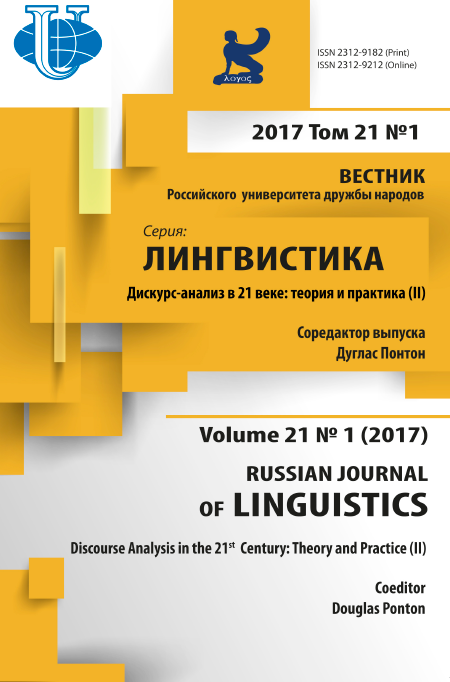Metapragmatics of Administering Justice in Russian and English Judicial Discourse
- Authors: Dubrovskaya T.V1
-
Affiliations:
- Penza State University
- Issue: Vol 21, No 1 (2017): Discourse Analysis in the 21 st Century: Theory an d Practice (II)
- Pages: 73-90
- Section: Articles
- URL: https://journals.rudn.ru/linguistics/article/view/15405
- DOI: https://doi.org/10.22363/2312-9182-2017-21-1-73-90
- ID: 15405
Cite item
Full Text
Abstract
This paper is intended as a contribution to a body of research on metapragmatics in courtroom settings, particularly in Russian and English judicial discourse, and presents the results of functional analysis of metapragmatic elements. In the article, I claim that meta-utterances are inherent in judicial discourse and perform specific functions that are essential for practising judicial power and discretion in court as well as administering justice. The paper discusses functions of meta-utterances as they are presented in recent scholarship and offers a three-group classification of metapragmatic elements in judicial discourse, according to the types of reality distinguished in (Gibbons 2003). The first group contributes to constructing the primary reality, i.e. the reality of the courtroom; the second group assists in framing the secondary reality, i.e. the reality of the crime or misdemeanor; the third group deals with framing the legal reality. Altogether, these groups of metapragmatic elements construct an organizational frame for the trial. Data for the analysis are drawn from a few trial transcripts of modern Russian and English cases (1998-2008). By using Russian and English data for the analysis, it is demonstrated that the principal functions of judicial meta-utterances are marked by parallelism in Russian and English, while minor differences discovered are related to some other pragmatic categories, e.g. politeness, that are more nationally and culturally specific.
Keywords
About the authors
Tatyana V Dubrovskaya
Penza State University
Email: gynergy74@gmail.com
40 Krasnaya str., Penza, Russia, 440000
References
- Andrus, Jeniffer (2009). The development of artefactual language ideology: utterance, event, and agency in the metadiscourse of the excited utterance exception to hearsay. Language and Communication, 29, 312-327
- Caffi, Claudia (2006). Metapragmatics. In Keith Brown (ed.), Encyclopedia of Language and Linguistics. Amsterdam: Elsevier, 82-88
- Carranza, Isolda E. (2008). Metapragmatics in a courtroom genre. Pragmatics, 18:2, 169-188
- Ciliberti, Anna & Laurie Anderson (2007). Metapragmatics comments in institutional talk: a comparative analysis across settings. In Wolfram Bublitz, Alex Hübler (eds.) Metapragmatics in Use. Amsterdam: John Benjamins, 143-166
- Fuertes-Olivera, Pedro A., Marisol Velasco-Sacristán, Ascensión Arribas-Baño & Eva Samaniego-Fernández (2001). Persuasion and advertising English: metadiscourse in slogans and headlines. Journal of Pragmatics, 33 (8), 1291-1307
- Gibbons, John (2003). Forensic Linguistic. An Introduction to Language in the Justice System. Oxford: Blackwell Publishing
- Gillaerts, Paul & Freek Van de Velde (2010). Interactional metadiscourse in research article abstracts. Journal of English for Academic Purposes, 9, 128-139
- Haberland, Hartmut (2007). Language shift in conversation as metapragmatic comment. In Wolfram Bublitz, Alex Hübler (eds.) Metapragmatics in Use. Amsterdam: John Benjamins, 129-140
- Hübler, Alex & Wolfram Bublitz (2007). Introducing metapragmatics in use. In Wolfram Bublitz, Alex Hübler (eds.) Metapragmatics in Use. Amsterdam: John Benjamins, 1-26
- Hyland, Ken (2004). Disciplinary interactions: metadiscourse in L2 postgraduate writing. Journal of Second Language Writing, 13, 133-151
- Hyland Ken (1998). Persuasion and context: the pragmatics of academic metadiscourse. Journal of Pragmatics, 30 (4), 437-455
- Hyland, Ken & Polly Tse (2004). Metadiscourse in academic writing: a reappraisal. Applied Linguistics, 25, 156-177
- Ifantidou, Elly (2005). The semantics and pragmatics of metadiscourse. Journal of Pragmatics, 37, 1325-1353
- Ilie, Cornelia (2003). Discourse and metadiscourse in parliamentary debates. Journal of Language and Politics, 2:1, 71-92
- Janney, Richard W. (2007). “So your story now is that...”: metapragmatic framing strategies in courtroom interrogation. In Wolfram Bublitz, Alex Hübler (eds.) Metapragmatics in Use. Amsterdam: John Benjamins, 223-235
- Khabbazi-Oskouei, Leile (2013). Propositional or non-propositional, that is the question: a new approach analyzing ‘interpersonal metadiscourse’ in editorials. Journal of Pragmatics, 47, 93-107
- Mur-Dueñas, Pilar (2011). An intercultural analysis of metadiscourse features in research articles written in English and in Spanish. Journal of Pragmatics, 43, 3068-3079
- Mur-Dueñas, Pilar (2007). “I/we focus on...”: a cross-cultural analysis of self-mentions in business management research articles. Journal of English for Academic Purposes, 6, 143-162
- Penz, Hermine (2007). Building common ground through metapragmatic comments in international project work. In Wolfram Bublitz, Alex Hübler (eds.) Metapragmatics in Use. Amsterdam: John Benjamins, 263-292
- Philips, Susan U. (1998). Ideology in the Language of Judges. How Judges Practice Law, Politics and Courtroom Control. New York, Oxford: Oxford University Press
- Schubert, Christoph (2012). Follow-up questions in White House press briefings: metacommunication in cohesion and framing. Language and Dialogue, 2:3, 449-463
- Stubbs, Michael (1983). Discourse Analysis: The Sociolinguistic Analysis of Natural Language. Oxford: Blackwell Publishing
- Suzuki, Satoko (2007). Metapragmatic function of quotative markers in Japanese. In Wolfram Bublitz, Alex Hübler (eds.) Metapragmatics in Use. Amsterdam: John Benjamins, 73-85
- Thompson, Susan Elizabeth (2003). Text-structuring metadiscourse, intonation and the signalling of organization in academic lectures. Journal of English for Academic Purposes, 2, 5-20
- Vande Kopple, William J. (2012). The importance of studying metadiscourse. Applied Research in English, 1(2), 37-44
- Викторова Е.Ю. Лингвокультурное своеобразие вспомогательных коммуникативных единиц в политическом дискурсе (на материале русского и английского языков). Известия ВУЗов. Поволжский регион. Гуманитарные науки, 2011. № 3, 91-97. [Linguocultural specifics of supplementary communicative units in political discourse (based on Russian and English languages). University Proceedings. The Volga Region. Humanities, 3, 91-97.]
- Ir. - Trial transcripts of ‘David John Cawdell Irving (claimant) and Penguin Books Limited, Deborah E. Lipstadt (defendants)’ (2000). URL: http://www.fpp.co.uk
- Sh. - Trial transcripts of Shipman ‘Regina v. Harold Shipman’ (2001). URL: http://webarchive.nationalarchives.gov.uk/20090808154959/http://www.the-shipman-inquiry.org.uk/reports.asp
- J.W. - Transcripts of the trial against the Jehovah’s Witnesses Organisation (1998-2002). URL: http://www.jw-media.org/region/europe/russia/russian/moscow/u_courttranscripts.htm
- H.N. - Handwritten
Supplementary files















